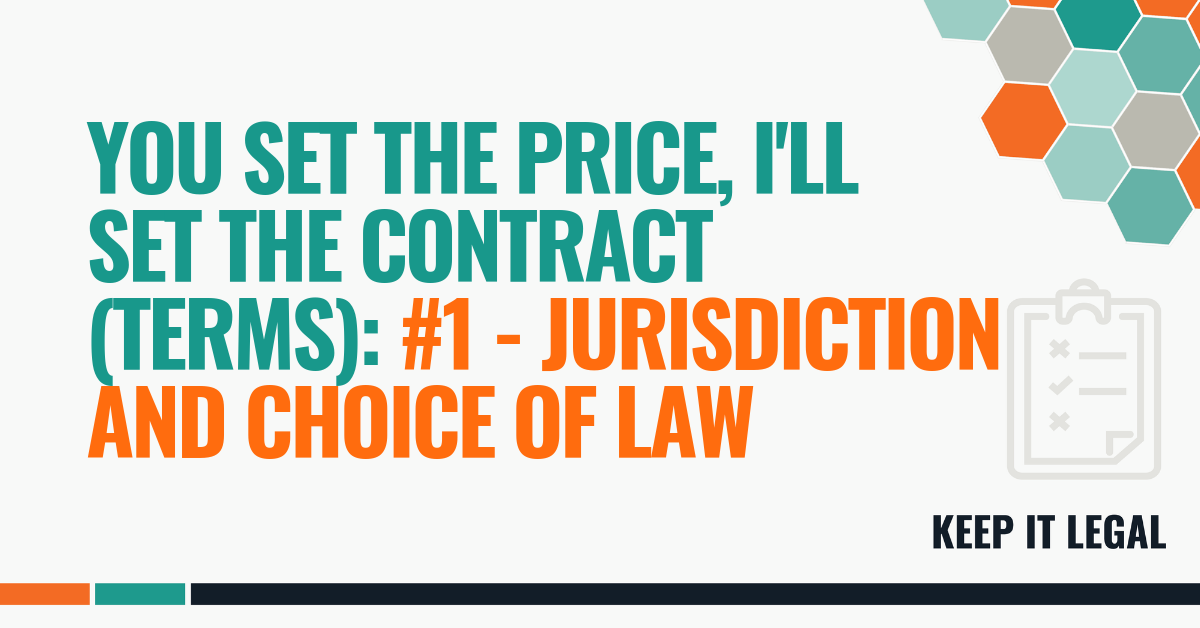You can always tell when someone is new to business negotiation because they can’t stop talking about price – how much they got paid for something, or how little they paid for something. Experienced negotiators know that oftentimes the terms of a contract are much more important than the top-level price. That’s the origin of the saying “You set the price, I’ll set the terms.” It’s a phrase that seasoned business people and lawyers often use.
OK, so it’s easy to throw that phrase around, but what do the terms actually mean?
I’m going to talk about a few common terms found in business contracts and how you can leverage them to get the most out of any agreement, regardless of price. This is eventually going to be a multi-part series, but you’re getting a sneak preview.
Today’s topic is “Jurisdiction and Choice of Law”.
Some of the good stuff is hidden at the end of most contracts – what people often call the “boilerplate”. A lot of this looks like standard language that you can just skip over after you’ve read the parts with dollar signs in front of them. But that’s not the case – those terms are just as legally enforceable as any other part of a contract, and it’s important to know what you’re agreeing to and where the negotiation points are.
First of all, Jurisdiction and Choice of Law are not the same thing. Jurisdiction refers to where a dispute will be heard – meaning, at what geographic location. Jurisdiction clauses often refer to courts in a specific county or city. If the contract has arbitration or mediation provisions, those clauses should also include Jurisdiction language.
Why is Jurisdiction important? First of all, it provides clarity: if we have to have a dispute over this contract, we both know where that dispute will occur. It’s also a zero-sum term in many cases, which means it’s a point of negotiation that has a winner and a loser. For example, if you’re in Puerto Rico and the other party to the contract is in Hawaii, wouldn’t you rather make the other guy travel halfway around the world, and incur all of that hassle and expense? Of course, in most circumstances, you’d rather have the case heard in your local Puerto Rico court.
The reality is that the party with the less convenient Jurisdiction is less likely to file a lawsuit, so this piece of “boilerplate” can be a very important term.
Sometimes, when contracting parties are arguing over Jurisdiction, they’ll pick a neutral venue – so if I’m in California and you’re in New York, we might agree for the dispute to be heard in Texas so we’re both equally disadvantaged.
Choice of Law refers to what set of laws applies to this contract – meaning, the laws of what country, state, county, or city. You might think this would be identical to Jurisdiction, and it usually is, but it doesn’t have to be. Technically, a contract dispute could be resolved in New York using Delaware law. But that requires the court in one state to be versed in the laws of another, so it’s not usually advisable.
So Choice of Law might sound simple, but there’s a twist. Some states are more business-friendly or have different approaches to legal issues. For that reason, lawyers often focus on the Choice of Law, meaning which state’s laws are going to apply, and then change the Jurisdiction to that state. So if you know that Delaware law tends to be business friendly, the Jurisdiction and Choice of Law terms may both refer to Delaware, even if neither party lives or does business there. That’s often a smart choice, but again, you need to know that in the event of a dispute, you’re going to be taking a trip – or multiple trips – to the great State of Delaware, so make sure you’re comfortable with that before signing the contract.
We’ve seen that Jurisdiction and Choice of Law, two of the often-overlooked terms at the back of a long contract, can have a huge impact on your legal rights and your ability to get what you want out of a business agreement. There are a lot of other business contract terms to talk about, and I look forward to sharing more of these tips with you in future blog posts.
Need help with your business contracts? Contact me.


